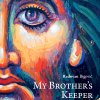As Professor Emeritus of English, he now spends his time writing and reading poems in public places all across the City, and all the more so with his title as the first Poet Laureate of the borough of Queens, an appellation assigned for the period of 1997 through the year 2000.
.Stepanchev is a consummate poetic craftsman. He arises every day at four a.m. to struggle with a few phrases and polish a few lines before his morning walk through Flushing. His poems, like his life, reflect the rich immigrant experience so familiar to our neighborhoods.
Stephen Stepanchev was born in Mokrin, Yugoslavia, in 1915. His mother brought him to Chicago when he was seven, where he quickly picked up English in his immigrant neighborhood. On a scholarship, he went to the University of Chicago, received his bachelor's and master's degrees and was elected to Phi Beta Kappa.
During World War II, he served in the U.S. Army, working in the Adjutant General's Office in London, Paris and Frankfurt. He received a Bronze Star Medal at the end of the War.
He has published a major critique of American poetry - American Poetry Since 1945 - ten collections of poems, and appears regularly in such venues as The New Yorker and Poetry magazines. He recently appeared in The Bedford Introduction to Literature, a major College anthology.
Biographical sketch by Robert C. Weller
Photograph by Nancy Bareis
СТЕФАН (СВЕТОЗАР) СТЕПАНЧЕВ, песник из Мокрина (Банат). Магистрирао је на Универзитету у Чикагу и докторирао америчку књижевност на Универзитету у Њујорку. 1949. Почео је да предаје на Одељењу за енглески на Квинс Колеџу, где је остао све до пензионисања 1985. Објавио је девет књига поезије, писао за Американски Србобран. Песме су му објављивање у престижним часописима Poetri, Modern poetri stadis, Njujork Kvarteli а два броја часописа Sperou посвећена су његовим делима.
Раша Попов је 1977. превео његове песме на српски, објављене су у Вршцу у збирци Голубица на багрему.
Познат је и као аутор књиге Америчка поезија од 1945. године која се користи у средњим школама и на колеџима широм САД.





